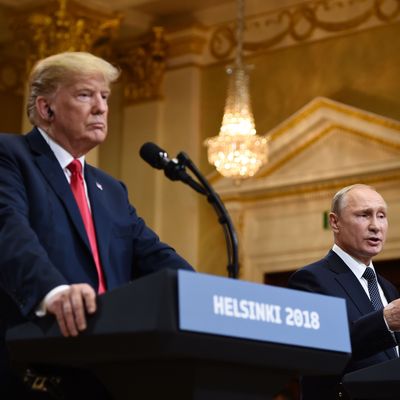
Vladimir Putin has cultivated a mix of overt and covert influence with a wide array of right-wing politicians throughout the West. In some respects, his alliance with Donald Trump fits the pattern perfectly. There is the openly shared ideology of white nationalism, with its belief that Christian Europe should ally with Russia against the common terrorist foe. There is the web of under-the-table financing connecting Putin to his allies and supporting their cause.
But in one crucial aspect, Putin’s American strategy has worked very differently than his political operations everywhere else. Whereas in most countries, Putin has created inroads with parties, in the United States he mostly cultivated just one person. That person happens to hold the most powerful office in the entire world, but he remains a solo actor. And the entire fallout from Trump’s bizarrely submissive meeting with the Russian president can be understood as the unspooling tension of a government whose leader stands totally apart from his party.
Well before Trump had even disembarked from his trip to Finland, Republican members of Congress and his own aides were registering their dismay at his performance. Trump defended his behavior in an interview with Sean Hannity, one of the few high-profile Republicans slavish enough to defend his open-channel collusion. As of Tuesday morning, he was still hoping to bring his party around. By afternoon, the pressure to climb down had grown too intense. John Kelly, Trump’s chief of staff, was, incredibly, telling Republican members of Congress to criticize the president. Trump’s own secretary of State and vice-president begged him to reverse himself.
And so on Tuesday afternoon, he delivered a forced recantation. Of sorts. Trump’s defense, that he accidentally said the opposite of what he meant to say, was difficult to believe under the best of circumstances. The context of his remarks, in which he dismissed allegations of Russian election interference, made it hard to believe he had intended to insinuate Russia was actually guilty.
Trump proceeded to erase whatever smidgen of credit he might have gained by undermining his stage directions. After putatively affirming the conclusion of U.S. intelligence that Russia had hacked Democratic emails, he added, “Could have been other people also. There’s a lot of people out there.” A reporter caught him crossing off from his prepared text a line promising to bring “anyone involved in that meddling to justice.” Perhaps he realizes that the people involved in Russia’s election meddling include members of his own campaign and, in all probability, Trump himself. Or else he has despaired that his Samuel Gerard–like hunt will ever track down the elusive 400-pound man who really stole the files.
By Tuesday night, Trump was predictably back to his original line, or perhaps had gone even further. In an inflammatory interview with Tucker Carlson (who, along with Hannity, had never left Trump’s side) Trump made another astonishing announcement. He cast doubt on the value of defending NATO allies:
Here was Trump not only picking fights with allies, as he has been doing for months, but seeming to abandon the promise of collective self-defense that is the heart of the NATO pact. Without that ironclad pledge, the alliance would dissolve, to Russia’s delight.
Some analysts have tried to explain away these kinds of sentiments as just Trump’s relentlessly selfish worldview. And yet in the very same interview with Carlson, Trump expressed a sense of gratitude toward Russia for its sacrifices as an American ally in World War II:
There is no remotely consistent thread between abandoning America’s current allies and expressing fondness for its old ones. NATO came to America’s defense after al Qaeda attacked the United States on September 11, 2001. That was the only time NATO has ever invoked its collective defense charter. And yet Trump is resentful of this obligation to countries that still support the United States even as he expresses his sense of debt for Russian help 75 years ago.
While the NATO comment is the more newsworthy, the Russia comment is the more telling. Has Trump ever formulated his policy toward another country in terms of historical moral obligation by the United States?
Trump’s Russophilia is not completely unique within his party elite. Representative Dana Rohrabacher has long attended to Russia’s interests in an idiosyncratic fashion. Russia has also wooed allies in the gun rights lobby. Beyond that, Trump has almost no support for his pro-Russia views. He continues to place his political standing at risk by issuing endless Russia-friendly statements. There are limits to what one person, even the most powerful one in the world, can accomplish without a party behind him. Trump seems bound to press those limits.






























